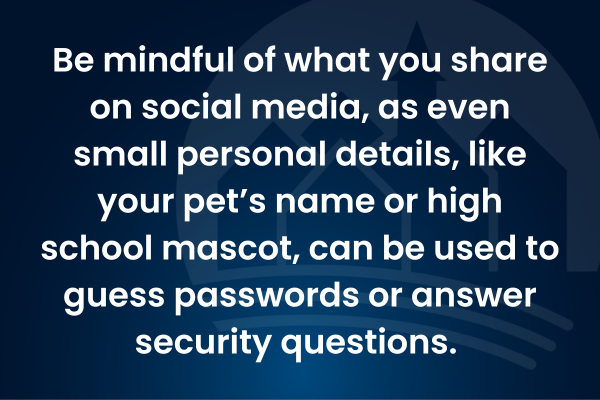Keep your devices updated
When your computer or phone prompts you to install updates, don’t wait. Many updates include important security patches that help protect against the latest threats. Set your devices and apps to update automatically so you’re always running the most secure versions.
Stay alert for scams
Phishing emails, fake texts, and scam phone calls are among the most common ways criminals try to steal personal information. Be cautious of any message that asks for sensitive details or urges you to act quickly. If something feels suspicious, pause and verify by contacting the company directly using a trusted phone number or website.
Avoid public Wi-Fi for financial transactions
Public Wi-Fi networks, like those in coffee shops or airports, are not secure. Avoid logging into your bank accounts or entering personal information while connected. If you need to access financial information on the go, consider using your phone’s data connection or a secure virtual private network (VPN).
Monitor your accounts regularly
Keep an eye on your bank and credit card statements for unusual activity. Setting up transaction alerts can help you spot issues early. If you notice something that doesn’t look right, contact your financial institution immediately.
Understanding the Bigger Picture
Cybersecurity isn’t just about protecting passwords, it’s about protecting your digital identity as a whole. From your online shopping habits to the apps on your phone, every digital interaction leaves a footprint. Bad actors look for weak spots in those digital footprints to gain access to sensitive information.
Be mindful of what you share on social media, as even small personal details, like your pet’s name or high school mascot, can be used to guess passwords or answer security questions. Review your privacy settings on social platforms and limit the amount of personal information that’s publicly visible.
It’s also important to think beyond your own devices. Smart home technology, such as connected thermostats and security cameras, can also be vulnerable to hackers if not properly secured. Always change default passwords on new devices and keep firmware up to date.
Finally, remember that education is one of your strongest defenses. Stay informed about new scams and cybersecurity trends, and share what you learn with friends and families, especially those who may be less familiar with online security.
At Kennebec Savings Bank, we take cyber security seriously and are committed to protecting our customers’ financial information. By taking a few extra precautions, you can help ensure that your personal data, and your money, stay safe.



